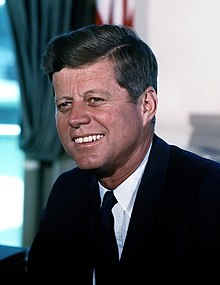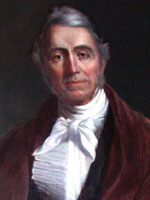User:-A-M-B-1996-/sandbox4
History[edit]
Founding[edit]
The modern Massachusetts Democratic Party traces its earliest roots to the opposition to Secretary of State John Quincy Adams in the 1824 and 1828 presidential elections. At that time, Massachusetts was dominated by remnant Federalist conservatives and nationalist Jeffersonian Republicans aligned with Adams.
Leading citizens, including David Henshaw and Marcus Morton, dissented from both groups. The dissidents were primarily united in their opposition to an "aristocratic state." Henshaw, along with editor Nathaniel Greene, began to criticize Adams as unfit for the presidency as early as 1823, in the pages of the Boston Statesman. In rural Massachusetts, opposition to Adams was led by Lieutenant Governor Marcus Morton. Though Adams won the state easily, his opponents had established the base for a new political party in the state.[1]
Though Morton and Henshaw each tried to reconcile with the Adams administration and Governor Levi Lincoln Jr., they soon found their differences were too great to overcome, and each left the Lincoln-Adams faction for good. The division between wealthy conservatives in the Adams camp and the poorer supporters of Henshaw continued to grow following the 1827 controversy over the Charles River Bridge, wherein populist and farming interests led by Henshaw organized in opposition to Lincoln. However, the opposition failed to find a willing opposition candidate and were crushed at the polls.[2]
During that 1827 election, Federalists and "Anti-Warren Bridge" Republicans organized in support of the Adams administration, creating a new National Republican Party in Massachusetts which shut out Henshaw and his Statesman group entirely and permanently. These men soon organized themselves in support of Andrew Jackson, the leading opponent to Adams's re-election.[3] In 1828, this faction was joined by another anti-Adams faction of conservative ex-Federalists, led by Theodore Lyman II and the publishers of the new Jackson Republican, which soon merged with the Evening Bulletin.[4] As the party was a decided minority within the state, conflict between the Lyman and Henshaw Democrats over federal appointments marked the early years. David Henshaw became collector of the Port of Boston under Andrew Jackson, and Lyman left the party soon after.[5]
Early years (1828–70)[edit]
In its early years, the Massachusetts Democrats were a permanent minority faction made up of rural groups, immigrants, and factory workers. The party was dwarfed by the dominant National Republican and Whig Parties and won only four of the thirty-two annual gubernatorial elections before 1876. The first of these, in 1839, was won by only one vote. After winning another in 1842, the final two victories were won in 1849 and 1850 by a coalition tactic of uniting with the anti-slavery Free Soil Party to deny the Whigs a majority and throw the election to the state legislature, where the Free Soilers supported the Democratic nominee George S. Boutwell.
In 1838, Marcus Morton and his aide George Bancroft won control of the party from Henshaw;[6] this divide was largely between a liberal rural and conservative urban faction. Morton and Bancroft opposed slavery on anti-aristocratic grounds; Morton had earlier broken his alliance with John C. Calhoun over his perception that Calhoun's nullification was not a principled stand for democracy but the desperate preservation of the slave system.[7]
Post-war revival (1876–1900)[edit]
The Democratic Party in Massachusetts was lacking in well-organized structure and strong leadership for much of the post-Jackson 19th century. They rarely gained control over the legislature, and only one governor (William Russell) served more than two consecutive one-year terms.
20th and 21st centuries[edit]
Irish Americans gained a measure of organizational power in the party beginning late in the 19th century, but it was not until the 1920s that the Irish, along with other immigrant groups and working-class interests, were able to forge a strong party structure that united their interests and consistently produced electable leadership. By the mid-20th century, the party was successfully contending with Republicans for all major state offices, and had by the 1970s achieved its present dominant position in the state legislature.

Despite numerous Republicans elected as governor, the Democratic Party was at the forefront of Massachusetts politics for much of the 20th century. Massachusetts Democrats, from John F. Kennedy to Deval Patrick, have played a prominent role in advancing the party's agenda and prominence on a local and national scale. The state's strength as a Democratic stronghold is such that it has not voted for a Republican for president since 1984, when Ronald Reagan was elected.
The 2006 elections solidified the Democratic Party's dominance in Massachusetts, when Deval Patrick became the first Democratic governor in 16 years. It was moderated in 2014 with the election of Republican Charlie Baker as governor. Currently, every Congressional delegate from Massachusetts is a Democrat. Democrats also occupy all constitutional offices in the Commonwealth's state government other than the governor and lieutenant governor (held by Republicans Baker and Karyn Polito), including Attorney General Maura Healey, Auditor Suzanne Bump, Secretary of State William F. Galvin, and Treasurer Deb Goldberg. The party holds super-majorities in both the state House of Representatives and the state Senate.
- Darling, Arthur B. (1925). Political Changes in Massachusetts, 1824–1848. New Haven, Conn.: Yale University Press.
- ^ Darling, Arthur. Political Changes in Massachusetts, 1824–1848. pp. 42–45.
- ^ Darling, Arthur. Political Changes in Massachusetts, 1824–1848. pp. 46–52.
- ^ Darling, pp. 53–54. sfn error: multiple targets (2×): CITEREFDarling (help)
- ^ Darling, p. 64. sfn error: multiple targets (2×): CITEREFDarling (help)
- ^ Darling, p. 80. sfn error: multiple targets (2×): CITEREFDarling (help)
- ^ Darling, p. 83. sfn error: multiple targets (2×): CITEREFDarling (help)
- ^ Darling, pp. 81–82. sfn error: multiple targets (2×): CITEREFDarling (help)


